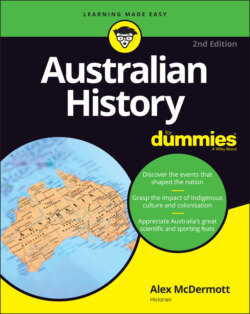Читать книгу Australian History For Dummies - Alex McDermott - Страница 120
Big Country? Big Ambitions? Bigge the Inspector? Big Problem!
ОглавлениеCommissioner Bigge arrived in Australia in 1819 with a remit to find out all that was necessary to change NSW back into an object of ‘Salutary Terror’ for would-be crims in Britain. As such, Bigge was always going to clash with Macquarie, who had long decided that the purpose of NSW was not as a stern deterrent against crime in Britain but as an opportunity for convicted felons to start again, in a new land with a clean slate.
The first flashpoint between Bigge and Macquarie took place over Macquarie’s promotion of ex-convict William Redfern to magistrate. Macquarie had appointed ex-convicts in previous years, but in those years no other candidates were available for the post. This time, however, other choices were possible, but Macquarie ignored them to give the appointment to a man who many considered to be an old Macquarie favourite.
This, thought Bigge, was insupportable and he gave Macquarie an ominous warning: Giving Redfern the job was a move that the British Government would ‘regard as a defiance of their Authority and Commands’. And Governors who defy His Majesty’s Authority and Commands tended not to last long in their careers.
Macquarie’s response was to make a spirited defence not simply of the Redfern appointment (where he probably thought he was on shaky ground anyway), but of his entire policy. He put it to Bigge that when he first arrived in NSW he’d, naturally, had no plans or desires to start raising convicts in society. The only thing he expected to do with convicts was control them. To his surprise, however, ‘a short experience showed me … that some of the most meritorious men … who were the most capable and the most willing to exert themselves in the public service, were men who had been convicts!’ And so, he argued, he’d developed a plan to encourage men and women according to merit (and material success) rather than past criminal conviction. The future of the colony, Macquarie told Bigge, was convicts and their children. He then went further, asking Bigge to ‘avert the blow you appear to be too much inclined to inflict … and let the Souls now in being as well as millions yet unborn, bless the day on which you landed on their shores, and gave them … what you so much admire … Freedom!’
A little verbose maybe, but Macquarie got his point across. More basically: This country belongs to them; don’t take it away. But more than that it was a plea to a man who had more power than any other to shape the future trajectory of the colony to not condemn the social edifice he’d been creating.
Bigge’s response was as measured and terse as Macquarie’s plea was flowery and sentimental. He pointed out he represented not only the ‘respectable’ opinion in the colony, but also that of the British Government. Bigge said that he was willing to try to ‘subdue the objections which must arise in the breast of every man’ whenever they were forced to associate with convicts and ex-convicts ‘but I also think with Lord Bathurst that this feeling may be carried too far; that there is a very wide difference between indulging a compassionate consideration towards convicts and rewarding them with honours or investing them with Magisterial Trusts’.
And Bathurst, ultimately, did agree with Bigge on Redfern’s appointment, saying ex-convicts certainly couldn’t be turned into magistrates. And, when Bigge finally published his reports on the colonies of NSW and Van Diemen’s Land after he returned to England, it turned out that Bathurst agreed with Bigge on just about everything else as well. (See Chapter 6 for the effects this had on colonial Australia and the system of transportation.)
